Time’s 2011 Person Of The Year: “The Protester”
Time Magazine has chosen "The Protester" as its Person Of The Year. Let the outrage ensue.
It’s that time of year again for Time Magazine to name its Person of the Year, and for people to complain about it. This year, the editors at Time returned to a formula that has become familiar, and somewhat annoying, in recent years. Instead of actually naming a person as person of the year and explaining why that person had such a huge impact on the world, which is what the concept was originally intended to be when Henry Luce started it so long ago, they picked a group. This year, the group is amorphously called “The Protester,” which Time describes thusly:
Once upon a time, when major news events were chronicled strictly by professionals and printed on paper or transmitted through the air by the few for the masses, protesters were prime makers of history. Back then, when citizen multitudes took to the streets without weapons to declare themselves opposed, it was the very definition of news — vivid, important, often consequential. In the 1960s in America they marched for civil rights and against the Vietnam War; in the ’70s, they rose up in Iran and Portugal; in the ’80s, they spoke out against nuclear weapons in the U.S. and Europe, against Israeli occupation of the West Bank and Gaza, against communist tyranny in Tiananmen Square and Eastern Europe. Protest was the natural continuation of politics by other means.
And then came the End of History, summed up by Francis Fukuyama’s influential 1989 essay declaring that mankind had arrived at the “end point of … ideological evolution” in globally triumphant “Western liberalism.” The two decades beginning in 1991 witnessed the greatest rise in living standards that the world has ever known. Credit was easy, complacency and apathy were rife, and street protests looked like pointless emotional sideshows — obsolete, quaint, the equivalent of cavalry to mid-20th-century war. The rare large demonstrations in the rich world seemed ineffectual and irrelevant. (See the Battle of Seattle, 1999.)
There were a few exceptions, like the protests that, along with sanctions, helped end apartheid in South Africa in 1994. But for young people, radical critiques and protests against the system were mostly confined to pop-culture fantasy: “Fight the Power” was a song on a platinum-selling album, Rage Against the Machine was a platinum-selling band, and the beloved brave rebels fighting the all-encompassing global oppressors were just a bunch of characters in The Matrix.
“Massive and effective street protest” was a global oxymoron until — suddenly, shockingly — starting exactly a year ago, it became the defining trope of our times. And the protester once again became a maker of history.
The Time feature story starts, of course, in Tunisia where a 26-year-old street vendor named Mohamed Bouazizi set himself on fire in downtown Tunis after being forced to endure yet another indignity at the hands of the police. That event set off waves of protests across Tunisia that led to the surprisingly fast downfall of President Zine El Abidine Ben Ali after 23 years in power. From Tunisia, the protests spread like wildfire. First to Egypt, where text messaging and Facebook helped organize a series of protests that led to the end of Hosni Mubarak’s 30 years in power. Protests also popped up in Yemen, which also led to the downfall of that country’s leader, and to Baharain where a Shi’ite uprising against the monarchy led to intervention by military forces from the other Gulf States. In Libya, the protests led to a brutal crackdown by the Arab world’s longest ruling dictator that set off a civil war that led to NATO intervention and, ultimately, to a new and uncertain future that had not known anything but the Gadhafi regime since 1969. Finally, protests even popped up in Syria where they continue to this day despite the efforts of Bashar Assad’s regime to brutally repress it. The future course all these uprisings will take is still not clear, but it surely cannot be contested that, in the course of just eleven short months, the face of the Arab world, and teh world as a whole, has been changed significantly. Along with 1989 and 1848, 2011 looks to go down in history as a year of massive change, whether it will be for good or ill remains to be seen.
Of course, as Time notes, it wasn’t just the Middle East that saw protests in 2011:
In the spring, they spread to Europe. On May 15, tens of thousands marched to Madrid’s Puerta del Sol plaza, along with tens of thousands more in dozens of other cities, united by slogans like “We are not goods in the hands of politicians and bankers.” They were frustrated by unemployment, a lack of opportunity and politics headed nowhere. They called themselves Los Indignados, the Outraged.
Spain’s one-day march turned into a months-long self-governing encampment — one of the new defining characteristics of 2011’s brand of communal resistance. Throughout the country, about 6 million out of a population of 46 million participated in Indignados protests. Among those in Madrid was Olmo Gálvez, 31, an Internet entrepreneur just back from three years working in China and new to politics. He’d helped set up social-media networks for the protest. “It was marvelous to see people become the actors in their own lives,” he says. “You could watch them breaking out of their passivity.”
Ten days after the Madrid protests began, the contagion spread to Greece. George Anastasopoulos, 36, has a Ph.D. in sociology but earns his living as a DJ. “That first Sunday when we saw 100,000 people show up, we were overwhelmed,” he says of the Athenians’ camp in Syntagma Square, in sight of Parliament. “And then the second Sunday, 500,000 people showed up. That enthused us so much, and we started dreaming really big
(…)
In early August, after police in London shot and killed a young black man they were arresting, riots broke out all over England. Naturally, the rioters’ instantly resorting to violence attracted little sympathy. Yet a new, three-month study by the Guardian and the London School of Economics concluded that these rioters were also protesters, motivated by anger about poverty, unemployment and inequality as well as overaggressive policing.
(…)
Until late September, 99% of New Yorkers had never heard of Zuccotti Park, a privately owned public plaza tucked between the Federal Reserve Bank and the World Trade Center site. On the last Saturday of the summer — sunny, mid-60s, perfect — a couple thousand people showed up, a hundred slept overnight, and the occupation was on. It seemed as though the world would little note nor long remember it. On the third day, the first arrests — of protesters wearing Guy Fawkes masks in violation of an antique New York anti-insurrection statute — got scant attention.
For the next two months, though, the Occupy movement was one of the most-discussed news stories in the United States. It was hard for anyone to ignore it, whether they agreed with the movement or not, and while it now seems to have petered out and been taken over by malcontents who think that shutting down the Port of Oakland is a good substitute for having a coherent agenda, it’s entirely probable that some manifestation of it will return during the 2012 elections.
More recently, and not in time t make it into Time’s story, we’ve seen protests in Russia of all places over Parliamentary elections and a system that many, correctly, perceive to be rigged in favor of Vladimir Putin and his cronies. What will become of that only time will tell.
Of course, it’s not entirely appropriate to lump together the protesters in the Middle East, Southern Europe, London, and Zuccotti Park as if they are representative of the same phenomenon. The protesters in Tunis, Egypt, Yemen, and Libya were motivated by a combination of grinding poverty, political systems that gave them absolutely no voice in governance whatsoever, and regimes that brutally cracked down on any form of dissent. The protesters in Spain and Greece were motivated by the fact that decades of profligacy by their leaders was forcing massive cutbacks in a welfare state that their nations could no longer afford, with the terms being dictated by bankers in France and Germany. In London, the summer riots seemed to be motivated by little more than the desire by some groups to commit violence and the damage that was done to small businessmen in some parts of the city dwarfed any benefit that whatever political agenda they claimed to advance would have had. Finally, the Occupy movement seems motivated both by frustration over an economy that has been stagnant for going on 4 years and the sense that the political system was rigged against anyone who didn’t buy access to the levers of power in a government that has become far too big to even think about being responsive to the needs of the public. Yes they were all protesting, some more violently than others, but the fact that they were using similar tactics doesn’t mean that there’s much of a relationship between them.
It is perhaps the tying of the Middle East protests, the European protests, and the Occupy movement into the same narrative that is causing some people to react negatively to Time’s pick. Ed Morrissey, for example, is fairly dismissive of the entire concept:
Oh, please. First, the idea that political protest originated in the 1960s is nothing but nostalgic nonsense, and quoting the long-debunked Fukuyama at this point is almost self-parody. America has seen plenty of grassroots protests throughout its history, nor is the US alone. From our own history, we had massive anti-war and anti-draft protests in the 60s … the 1860s, in New York. It had the same effect as anti-war protests in the 1960s, which was that the war continued apace (and the nation elected a Republican as president in the next national election).
In 2009, Time had the same opportunity to pick “the protester” when the protests were the Tea Party and Iran’s Green Revolution, which followed from Ukraine’s Orange Revolution, and so on. Who did they pick? Ben Bernanke. When the Tea Party movement actually delivered results at the ballot box in 2010 in a historic midterm drubbing of Barack Obama’s Democrats — they lost 68 seats, the worst outing since 1938 — they could have hailed The Protester then, too. Who did they pick? Facebook founder Mark Zuckerberg.
So they’re a little late to “the protester” story in terms of real impact. And what impact has “the protester” actually had in 2011? Has the Occupy Movement, such as it is, had any kind of ground-breaking impact on politics in the way the Tea Party did in 2010 and still does in this cycle? Not even close, and even people on the Left have begun washing their hands of the literally pointless display. The Arab Spring protesters have had somewhat more impact, but the two dictators they overthrew in Tunisia and Egypt look to be replaced by Muslim Brotherhood theocrats. In Libya, Moammar Qaddafi didn’t get taken down by “protesters,” but by an armed insurrection that combined several militia forces with NATO’s air power dropping bombs on the capital for several months. In Syria, the Assad regime is mowing down the protesters while the US and Europe stand idly by. In that sense, it’s exactly like Iran in 2009 — when Time passed on the opportunity to name the martyred Neda as their person of the year.
I’m not sure I agree that Time was wrong in 2009 when it named Bernanke, and by extension the efforts to pull the United States’ economy out from its deepest recession in a generation, was the most significant news story of 2009. Yes, the Iranian protests were an important news story but the most important of the year? Probably not, especially from the perspective of an American news magazine. Moreover, its worth noting that the title “Person of the Year” isn’t meant to be honorific, but to make note of the most significant newsmaker of the year. Which is why it made perfect sense for them to name Hitler as Person of the Year for 1938 as the world careened toward a conflict that was only nine short months away, or Stalin as Person of the Year for 1939 given the role the Non-Aggression Pact played in allowing Germany to have free reign for the first year of World War II.
We don’t know what impact the protests movements that raced around the world this year will have in the future. There are fears in Egypt, Tunisia, and Libya, that greater democracy will lead to the rise of Islamist governments that will pose problems for the West, and lead to renewed domestic repression. None of the nations in Southern Europe have adequately dealt with the fiscal problems that faced them in 2011, and its entirely probable that the Eurozone will compete with the U.S. Presidential Election for our attention in the headlines in 2012. Here in the Untied States, it still seems unlikely that the amorphous, unorganized, and seemingly fizzled Occupy movement will lead to anything significant politically, but it’s already clear that the Obama campaign intends to adopt at least parts of its message for the campaign so we’re going to be talking about those issues for most of next year as well.
In the end, I think we’ve come to the point where this “Person Of The Year” choice ends up generating far more attention than it’s really entitled to given the declining influence of news magazines in the United States. Usually, that attention comes from people complaining about the choice, or complaining that one person, group, or movement or another was ignored unfairly. Frankly, I can’t see how it really matters. When Time picked Charles Lindbergh as the first Person Of The Year it meant something. Now, though, if you look through the list of Persons of the Year, especially in the years before 1938, there are many people on the list that make you wonder either who they are or what they did that was so newsworthy that they deserved the cover of one of America’s top magazines at the time. Many of the names have faded into history — does anyone remember who Owen Young was today, or Hugh Samuel Johnson? Does it matter? At this point, much like news magazines themselves, the Person of the Year has outlived its usefulness except as a means to garner attention for Time Magazine once a year.
That said, who can deny the bravery of the protesters who stood up against dictatorships across the Middle East, or the anger of protesters in the West when they look at a world that seems to offer a far different future than the one promised to them? And even if you can, saying that this wasn’t the most newsworthy event of the year seems rather silly since it seems to have been the only thing we all talked about from January until now other than the ridiculous circus that is the race for the Republican Nomination for President.
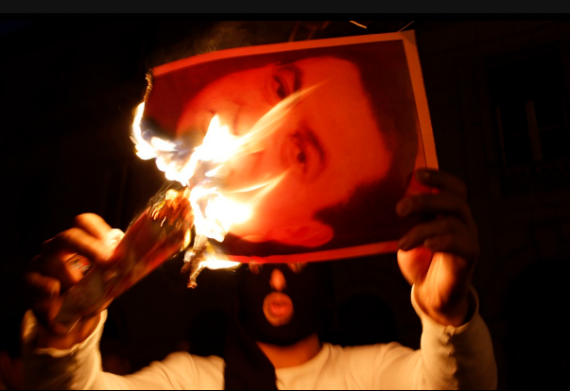

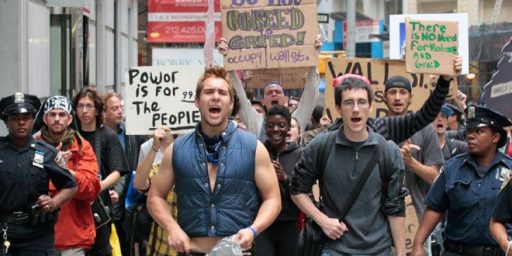
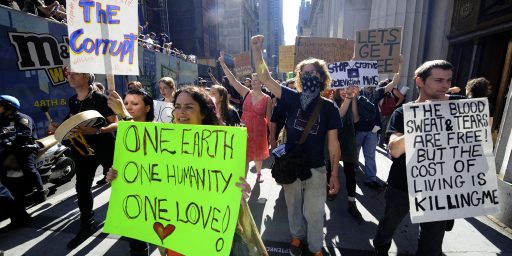
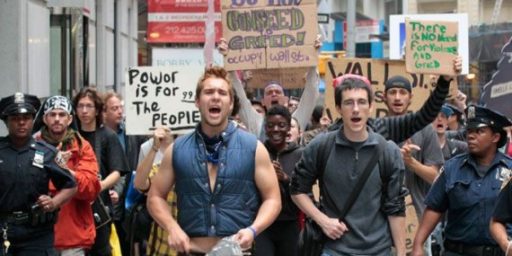

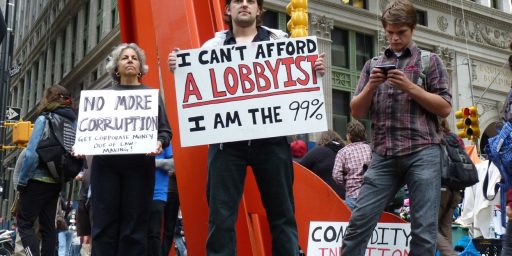
So funny … a post in which Doug reports “The Protester” (including OWS) as being Time’s man of the year, but in which he must also rationalize his decision to fight recognition of the same phenom, every step of the way.
@john personna:
I’ve never said OWS wasn’t newsworthy. Whether it will amount to anything worthwhile is the real question
@john personna:
Doug carries on his lonely quest to get us to ignore Occupy by writing obsessively about how we should ignore Occupy. Now he’s declaring them dead. So I guess I we won’t be reading another dozen posts from Doug that continue to insist we ignore what he’s writing about.
@michael reynolds:
Just waiting for them to grow up and do something constructive. I have time.
Is anyone using Four Square to find drum circles?
Time Magazine still is being published??
@Doug Mataconis:
Obviously that doesn’t square with The Protester, including an OWS mention on the cover, as being Time’s Man of the Year.
Do you ever try to square your cognitive dissonance, or do you just go with it?
Doug, you’re the only guy left on earth who doesn’t know what Occupy wants. Try visiting their site. They have special sections for the slow among us who just . . . can’t . . . quite . . . figure. . . it . . . out.
You may have forgotten that I wrote about their silly manifesto some time ago. I’m talking about serious policy proposals, not stuff you come up with in a college dorm bull session.
Wait, I don’t understand. If you are trying to distinguish Arab Spring protesters from the Occupy Movement, why would you make them sound the same?
This strikes me, contra Ed Morrissey, as an exceptionally good choice. Protests have, in fact, been a major story this year. The Arab Spring alone would have made this a perfect choice, the OWS actions have also been of significance domestically (and despite the lack of OWS, to date, generating a coherent political movement, I do think that they have generated debate over several key issues, not the least of which being income inequality and police behavior).
Also, protesting, in general, captures the zeitgeist of the moment, I should think.
@UberMitch:
And if you are comparing the United States to Assad’s Syria or Gaddafi’s Libya you are just being absurdly silly
@Steven L. Taylor:
I tend to agree, as I think the post makes clear. Sometimes, Time makes odd choices, like last year when they picked Mark Zuckerberg as POTY rather than the politician movement that had just helped pull off the biggest change in the membership of the House in a generation, but I think they got it largely right this time. That said, I’m not sure whether this POTY designation matters much anymore.
Shorter Doug: DRUM CIRCLE
@Doug Mataconis:
Perfectly describing your own libertarian philosophy.
@ Michael…
that kind of insults college dorm bull sessions…just sayin’
I don’t like it when they choose a nebulous group; “the American soldier” or “You!” or “the protester.” I think it’s a bit of a cop-out. If they wanted to highlight the protest movements, why not Mohamed Bouazizi himself? He provided the match that started the Arab Spring.
Ironically this morning at The Political Commentator, before this Time cover had come out, I had discussed the fact that OWS has reached 5,000+ arrests over the course of its protests while the participants still had little idea about what they were protesting for.
Do they truly represent “Man of the Year” material? About as much as Obama represented Nobel Peace Prize material!
Read the article here http://bit.ly/uFAQfk
@Michael Haltman: You are missing the point if you think that OWS is the person of the year.
@Steven L. Taylor:
I first wondered what they meant, but when I read the blurb, I got that the point that the “Protester” was a interesting choice and thought it a pretty good one, though I do agree with Doug a bit that conflating them with the OWS is problematic.
This choice plays directly into the Authoritarian streak of the right wing, raising the blood pressure in indignation and righteousness.
It’s clear from the post and the comments there, and from looking at a few other dank places on the intertubes that the far right has automatically defaulted to a America-centric reaction of the choice, of thinking only of the OWS crowds as what the “Protester” is.
Kind of pathetic, really.
It dismisses any consideration for what the actual choice was all about, and is, again another knee jerk reaction to ANYTHING that does not reinforce the right’s world view.
They don’t do nuance.
One thing: I just can’t wrap my head around what happen to Ed Morriessy once he went to HA.
He used to be able to think critically, but this post is a joke logically – he berates Time for ignoring an international figure – Nadya (sorry if the spelling is off) and going for Bernanke instead in 2009, while ignoring a international movement this year and focusing on the national aspect of it only.
@Steven L. Taylor: I think you are missing my point. I specifically said they represent Man of the Year the same way Obama represented the Nobel Peace Prize! As in not at all!
@Michael Haltman: The antecedent to “they” in your comment was OWS. As such, your comment appears to be ignoring the entire Arab Spring as being the main impetus here.
@Michael Haltman: Also, your point seems to be a partisan one, rather than an evaluation of the selection. If I am mistaken by that, I stand corrected.
@Steven L. Taylor: I suppose you are correct that my comment was partisan in nature, but by the same token I also do not view the Arab Spring protests as being any more successful than OWS.
As a matter of fact it may be much more destructive to that region than OWS could ever have been here in the US.
Portrayed as a Democratic uprising in the media, what history will prove it to be was an opportunity for Islamic fundamentalists to take over those governments with the student protesters merely being used as pawns inside a much larger plan.
@Michael Haltman: Yes, but the POY is not about positive or negative, but about a story that helps define a given year (heck, Hitler and Khomeini have been MOY).
The issue is, apart from the recession and the Euro crisis, the Arab Spring (good, bad or indifferent) was perhaps the most significant story of the year. Speaking as a political scientist who studies things like regime change, I can assure you that the events of the Arab Spring will have (and are still having, see: Syria) profound and long-term effects. Throw in OWS as an example of domestic protest (like it or not) and the Russian protests and you have a Year of the Protester.
I always find the critiques of te POY a bit annoying, because most people (liek Morrissey in this case) because they look at it from either a like/dislike POV or because of some partisan purpose (e.g., “what about the Tea Party?!”).
Back to newsworthiness, the two longest term stories that people will be talking about a decade from now will be: the Arab Spring and the Euromess.
Also: looking to protests underscores the general level of global discontent at the moment, which is a reminder of the global economic crisis (which, like or not, OWS represents a reaction to the economy). The more I think about it, this is one of the best selections in some time.
Also, I was the guy who was rather publicly skeptical here at OTB about Egypt (“Call it What it is: A Military Coup“), so it isn’t like I am a Pollyanna on what the Arab Springs means.
@Steven L. Taylor: I respect your thoughts and opinion.
@Michael Haltman: Kind of you to say.
Sorry about the onslaught: I can be dangerous when I am avoiding grading! 😉
@Steven L. Taylor:
No, but they did get a shout-out on the cover.
@Steven L. Taylor:
You do side with “seeing” a bit more than “not seeing,” but this long sentence does wander over the contradiction, doesn’t it?
In one sentence you can say they lack coherence, and by the end you can say you get their message.
@john personna: No, not really. I think that there is a distinction to be made between “generating a coherent political movement” and having “generated debate.”
These are different things, are they not?
(Or perhaps I am missing your point?)
@Steven L. Taylor:
Why wouldn’t it be enough for a political movement to generate debate?
Or, to what extent are the hurdles for approval artificial?
I think one needs a bit of a tin ear to really get the message, and not get the message at the same time.
Basically the “Protester” cover generates a stock drama. The central gimmick of the play is to have the chorus on-stage, but to have them invisible some half of the actors, who interact with them nonetheless.
@john personna: While I am willing to assume that I am being unclear, may I note that this is one of those times in which I feel like you are arguing with me about something I didn’t say/an incorrect interpretation of what I mean.
You seem to be suggesting that I am falling into the “OWS is a bunch of hippies in drum circles” type of dismissal. Rather, as I have stated elsewhere, I think OWS matters and, to use the same formulation from above, I think they have generated important debate (and on topics that will resonate into next year, and perhaps beyond). I still do not think that they have created a coherent political movement (which to me means an organization that can raise funds, lobby, recruit candidates, keep the message alive, etc.).
Also: I have no problem with the whole “protester” thing in general.
So this time rather than get annoyed, I am going to ask (without any hint of sarcasm or ire): how am I being unclear/what is it you think I am trying to say/what are you trying to say to me directly?
@Steven L. Taylor:
I think your agreement on the lack of a “coherent political movement” was a hat-tip you should not have done.
We should not be judging this by “foreign criteria.”
Did the OWS group name creating a “coherent political movement” as their goal? That is probably the key question. If not, then every time someone dings them with this, it is with some foreign goal they did not have.
OWS is not structured as I would have done, but I can be flexible, and look at them with their own goals and motivations in mind.
Or, do you see it at all ironic that we have so many stories on OTB’s anarchist roots, even as critics boggle at the lack of that “coherent political movement?”
I mean, that can’t be just me, to see a contradiction there, can it?
(I said OTB, lol)
@john personna:
I don’t see that as a hat tip to anyone. It is my honest professional assessment at the moment. I don’t see any controversy concerning the statement. Indeed, it seems to me that the very nature of a relatively spontaneous movement across large swaths of geography is, by definition, not yet a coherent political movement (the word “movement” is the key one in what I talking about here).
I am not sure what you mean here. Which “this”? (OWS in general?). And what “foreign criteria”?
I am not sure, by the way, what their motives are when assessing them. Social phenomena are not to be defined solely (or sometime at all) by the motivations of their participants. I am looking at this in terms of actual behaviors and outcomes.
I think you are either ascribing incorrect motives to my position.
@Steven L. Taylor:
Well then, I’ll say it without pinning it specifically on you.
When a movement is widely recognized to have “anarchist roots,” and has eschewed structure, then we should judge them on that basis.
They are a anarchist work in progress. We get to see how something fairly unique plays out.
We know though, that they won’t look like a conventional American political movement anytime soon, and probably will not ever.
@john personna: Ok, at least I understand where you are coming from (or, at least I have a better idea).
I am not sure I have anything especially useful to add at the moment. We shall see if it is fair to call OWS a genuine anarchist movement. I have my doubts, but am open to the idea.
@Doug Mataconis:
“I’ve never said OWS wasn’t newsworthy. Whether it will amount to anything worthwhile is the real question.”
It already has, Doug. The decision by New York Gov. Andrew Cuomo to cut taxes for the middle class and *raise them on millionaires* is a direct result of the Occupy movement. He would never have done that w/o the pressure that came from OWS. And less tangibly but no less significantly in my view is the documented uptick of media coverage of “income inequality” — both the term itself and the substance of it.
Kathy,
Nonsense. “Tax the rich” has been part of the Democratic Party mantra for decades.
@Doug Mataconis:
And how often has it actually happened, Doug? Democrats talk a lot of wonderful things that they don’t follow through on, if they are not pushed to do so by the people who elected them. That’s what happened here.